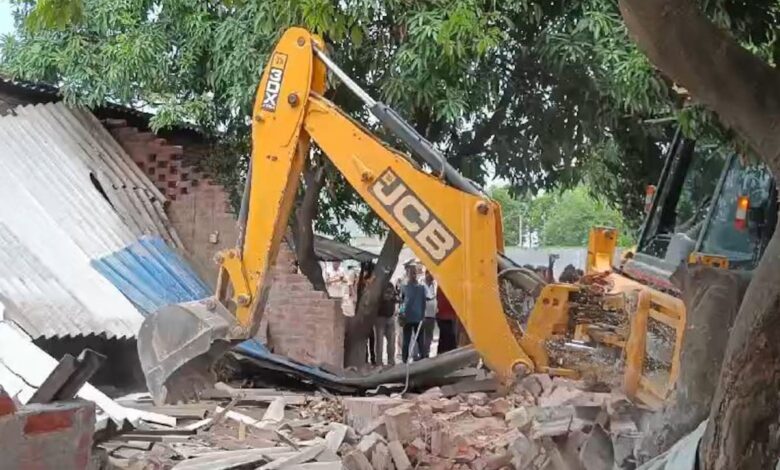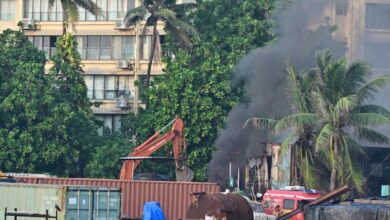Will Lay Down Pan-India Guidelines On Demolition Of Properties: Supreme Court

The Supreme Court made it clear that it will not protect any encroachment on public places.
New Delhi:
The Supreme Court on Tuesday said it will lay down pan-India guidelines on demolition of properties and any religious structure in the middle of a road, be it a ‘dargah’ or a temple, “has to go” because public interest is paramount.
Observing that merely because somebody is an accused or even a convict cannot be grounds for demolition of property, the Supreme Court reserved its verdict on a batch of pleas which have alleged that properties, including those belonging to those accused of crime, were being demolished in several states.
A bench of Justices BR Gavai and KV Viswanathan said unauthorised construction made by any person, irrespective of his religion or belief, has to be removed.
The bench said its September 17 order, which had said there would be no demolition of properties till October 1 without its permission, will continue till it decides the matter.
“Whatever we are laying down, we are a secular country. We are laying it down for all the citizens, for all the institutions, not for any particular community,” the bench said.
“On the first day we had pointed out, if there is any religious structure on the middle of a road, may it be a ‘dargah’ or some temple, it has to go because public safety and public interest is paramount,” it said.
The bench also observed that there cannot be a different law for a particular religion.
“We are going to make it clear that merely because somebody is an accused, or even somebody is a convict, can’t be a ground for demolition,” it said.
The Supreme Court made it clear that it will not protect any encroachment on public places, roads, footpaths, government lands, forests, water bodies and the like.
“Whatever directions we issue, it will be applicable pan-India,” it said, adding, “We will take care to ensure that our order does not help the encroachers on any of the public places.” During the hearing, the bench observed that notices for demolition of properties be sent through registered post to the owners and it should also be displayed on an online portal so that a digital record is there.
It also observed that judicial oversight may also be required over the correctness of orders passed by the authorities.
The bench suggested there should be a time window of 10 or 15 days between the order of demolition and its implementation so that people can make alternate arrangements.
“… it is not a happy sight to see women and children on the roads,” the bench observed, adding that if demolition is done after 15 days, nothing is going to be lost.
The top court was hearing the petitions filed by Jamiat Ulama-i-Hind and others seeking directions to various state governments to ensure no further demolition of properties of those accused in cases of rioting and violence takes place.
The Jamiat Ulama-i-Hind had earlier filed a plea in the Supreme Court over the demolition of some buildings in the Jahangirpuri area of the national capital.
It had also said no demolition should be carried out without following the due process of law and without prior notice.
At the outset, Solicitor General Tushar Mehta, appearing for the states of Uttar Pradesh, Madhya Pradesh and Rajasthan, said the top court had very rightly indicated that it would lay down guidelines for the entire country.
He referred to an affidavit filed earlier by the Uttar Pradesh government which said merely because a person is alleged to have been part of some offence, can never be a ground based upon which his immovable property can be demolished.
“Even if he is convicted, can that be a ground?” the bench asked.
“It can’t be,” Mr Mehta responded, adding, “Conviction can never be a ground for demolition.” The top law officer suggested that most of the municipal laws have a provision for issuance of notice and a written notice may be served by registered post to the owner of the property instead of pasting it on the wall.
He suggested that the notice must be confined to a specific violation of the particular law which was being invoked.
The bench observed the real problem that has to be addressed is when the authority takes action against violation in one property and does not initiate proceedings against another similar structure.
Mr Mehta told the bench that a petition filed before the National Green Tribunal has said about seven lakh square km of forest land was under illegal encroachment.
He said the court must consider that those who are illegal encroachers or have made unauthorised constructions should not get any “undue advantage”.
“I will put in my note incorporating suggestions. Your lordships may avoid anything which may result in amending or adding to the existing law,” Mr Mehta said.
The advocates appearing for the petitioners told the bench that there have been instances where demolition has been carried out immediately after filing of an FIR against an accused.
One of the counsels said people belonging to almost every community have faced demolition action and their concern was with respect to the misuse of municipal laws as a “punitive measure”.
Another counsel claimed there were instances where notices were not received by concerned persons before demolition action was carried out.
While hearing the matter earlier, the top court had observed that even one instance of illegal demolition was against the “ethos” of the Constitution.
(Except for the headline, this story has not been edited by NDTV staff and is published from a syndicated feed.)
Source link





